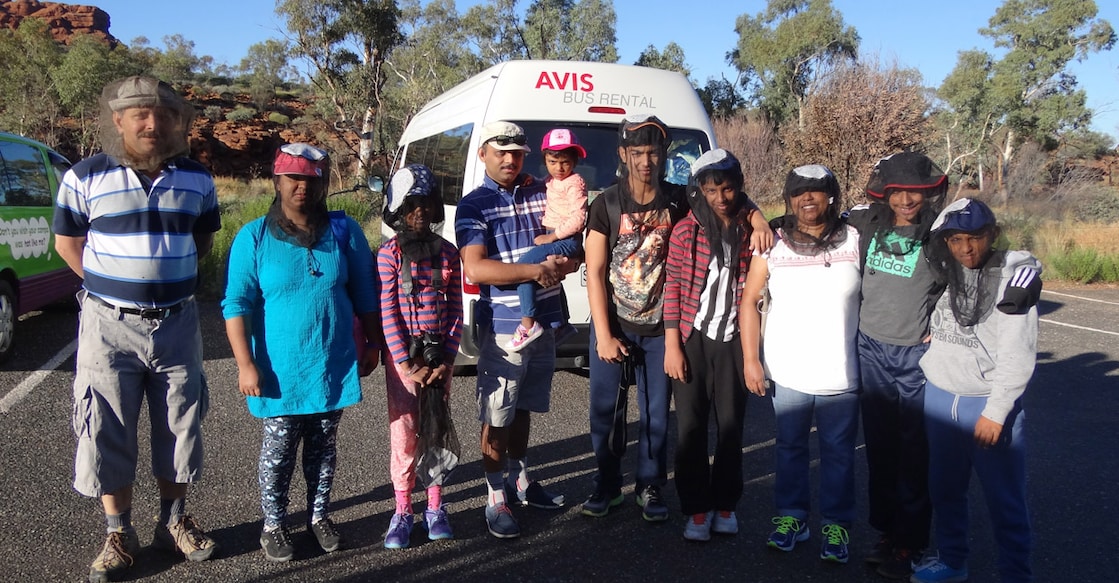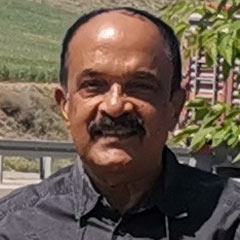Getting into trouble in the Australian outback

Mail This Article
We were around 500 kilometers into the interior of the Australian Outback when something happened that brought our journey to a sudden stop.
We had set out in the morning from Adelaide on the southeast coast of Australia for Uluru - or Ayer’s Rock – which stands in the heart of the barren, semi-desert plains of the Outback which dominates the Northern Territory. From Adelaide it is a drive of 1600 kilometers. The sun was setting and we were 90 kilometers short of Coober Pedy, the underground town in the desert where we were booked for the night.
There were 11 of us in a minibus – the Saji-Sibi family of six, the Santhosh-Soni family of four and myself – six children and five adults. My friendship with Saji had started in Cairo where he had been stationed in the late 90’s, and with Santhosh in Dublin, where he and his wife were working in the 2010’s. They had migrated at different times to Australia, a country which held out promise of a better life.

We had been travelling on the cross-continental Stuart highway, which runs from Port Augusta in South Australia to Darwin in the Northern Territory – a distance of 2720 kilometers. It had been a lonely drive through the vast, arid plains of the brush and bush of the Outback. The flatland rolled away to the horizons till where the earth met the sky. The highway itself was a relentless straight line ahead of us, a ribbon of concrete, that occasionally rose and fell and kept unfurling itself until it was swallowed by the farthest horizon. Hardly one or two vehicles had passed us in an hour. The dull grey bushes and the occasional bird that flew into view were the only objects one saw apart from corpses and skeletons of kangaroos killed by traffic. It seemed impossible that such a sparse traffic could kill anything at all.

Saji and Santhosh, who were in charge of driving, had ensured we had a full tank of fuel before we set out. That was an all-important precaution because on the Stuart highway fuel stations are situated at intervals of 200-300 kilometers. We were thus speeding towards Coober Pedy, looking forward to experiencing its strange life underground. In fact, we were booked into an underground hotel that had earlier been an opal mine.
Pedy is said to be the world’s opal stone capital. The simple reason why people chose to live underground was the heat. It reaches 52 degrees Celsius in top summer. Some people had converted abandoned mines into homes while some simply dug a home underground - also shopping malls, theatres, churches, banks and whatnot. There are a few buildings above ground too. But the feeling you get is that you’re walking around a ghost town that had been abandoned just when it was getting built. The only sign of the life underground were the tubes and pipes sticking out from the buildings below.

We were also looking forward to discovering the marvelous Uluru, our final destination. Put simply, it is the world’s largest monolith: length, 3.6 kilometers; height, 1141 feet; breadth, about two kilometers. Its body is sandstone, two-thirds of which is underground. In the middle of the Outback’s unending, bleak, desolate heartland that sprawls for thousands of kilometers all around, Uluru stands all alone steeped in a loneliness that is millions of years old. It’s not a sight that one can comprehend – or ever forget. It’s inexplicable. What’s it doing there? Where did it come from? It looks as though it was a gigantic spaceship aliens had abandoned in this lifeless plain. And it is famous for its fascinating color changes at sunrise and sunset, set in motion by the chemistry of the sandstone.
But suddenly we were in trouble. We had come to a sudden halt. The simple fact was that Saji and Santhosh had just noticed that the fuel gauge was blinking red. It said that we had only enough diesel to travel another five kilometers. And Coober Pedy was 90 kilometers away. The sun had sunk into the far edge of the plains and twilight was fast turning into night. The desert gets very cold at night. The food brought from home was finished, except for a few snacks. And we had six children on our hands.

Neither Saji nor Santhosh, who had filled diesel in the minibus in the morning could figure out how this disaster had happened. A grave error had occurred, and there was no explanation unless it was that they had somehow misunderstood the readings of the hired vehicle they were not used to. Now the all-important issue before us was: what next? We knew it was futile to attempt to flag the rare car that whizzed past at speeds of 180-200 kilometers. The only choice seemed to be to call the highway patrol. We were on a long downward slope when we had pulled over. We now decided to cut the engine and roll down till the slope came to an end. Then, there before our unbelieving eyes, was an illuminated board that announced a rest area! It was as if it was waiting for us. We parked there. We felt we had found Paradise. There were no other vehicles or people. We got out and stood there, the night and the desert chill creeping on us, pondering the next step.
Just then one of the children pointed to a corner and said, ‘Look! There’s a caravan!’ It’s difficult to describe the relief that flooded us. At least we were not alone! There was consensus that we should immediately get our act together and knock on the caravan’s door and make a request for just the small quantity of fuel that would take us to Coober Pedi. Saji said chances were that the occupant would come out with a gun in hand. In which case we needed to lift our hands in the air and stand still. To reinforce our innocent intentions, Saji and Santhosh decided to take the women and children along. The group took position before the caravan’s door and Saji knocked. It was a tense moment. We didn’t know what or whom to expect.
The door opened and an elderly gentleman, perhaps in his eighties, peeped out. If there was a gun he didn’t show it. He took a good look at us, came down the steps and smiled. He was dressed in Australia’s national dress: Bermuda and a sleeveless banian (vest). He said, ‘Hi!’ We all together responded, ‘Hi!’ Our joy was indescribable. He took one more good look at us and said, ‘So! I see you’ve run out of fuel.’ ‘Yes,’ we said wonderingly. How did he know! Then he asked, ‘You are Indians, aren’t you?’ We said yes. He said, ‘I guessed it.’
Then he told us that he had chosen to live in the caravan after retirement and had been on the move around Australia for the last ten years. At this point his lovely dog came out, trotted around us in a welcome dance, smelt us out and sat down next to his boss. That was indeed reassuring. The dog had certified us. The gentleman said, ‘He has been with me all these years. He too must be wanting to ask you the same question I want to ask you. In all these years there must’ve been at least fifty occasions when people running out of fuel on the highway approached me for help. Almost all of them were Indians. How come? Can you tell me?’
We knew the answer because we knew all too well the secrets of our Indian ways. But we pretended we didn’t know. We said we too were surprised at the phenomenon. Indians, if anything, we said, were overcareful about such things, perhaps to the extent of being fussy. We didn’t of course say that some of us, even as we fussed, took things for granted and expected the world to take care of us. We explained to him that in our case we did believe we had filled a full tank of fuel. But obviously we had blundered somewhere.

Then he sat down on the steps and gave us a short lecture on the discipline to be followed while traveling in the Outback. The first priority of course was well-stocked fuel. The second was well-stocked food. The third was more general: take nothing for granted when driving on deserted highways. So was the fourth: always remember you’re not in your own country and be extra alert. He added these details might look silly but when the crunch came, they made the big difference between life and death. He said he was particularly concerned because we were travelling with children. Children deserved to be safeguarded. He then asked, ‘How much diesel do you need?’ We mentioned the quantity. He asked, ‘What price did you pay for diesel in Adelaide this morning?’ We mentioned the figure. He said, ‘I’m going to give you the diesel. But I’ll charge you double. I don’t need the money. But I want you to remember this moment next time you travel in the Outback – especially with children.’
Then he poured out the diesel. He counted the cash we gave and entrusted it to the dog who trotted into the caravan with the cash between his teeth. Saji and Santhosh gave the gentleman a big hug. Others shook hands. ‘Good luck!’ he said and walked back into the caravan. The dog peeped out for a last look and gave us a goodbye bark. I think he liked the smell of Indians – he had obviously smelt many. And we sped on our way to the underground world of Coober Pedi, racing through the tunnel of light our minibus carved into the dark desert night.




